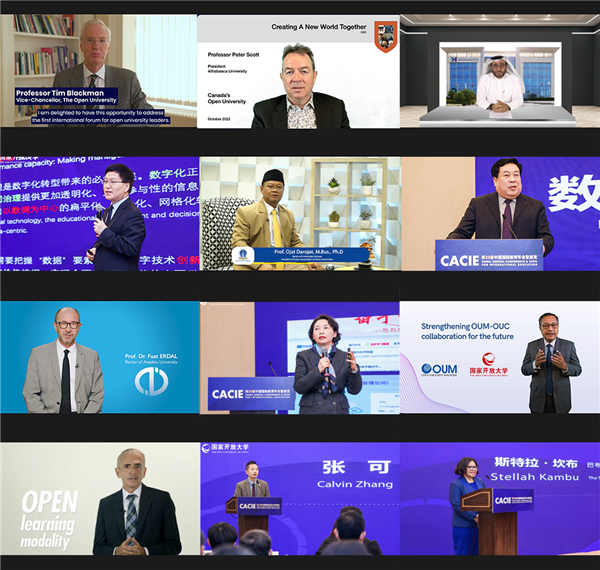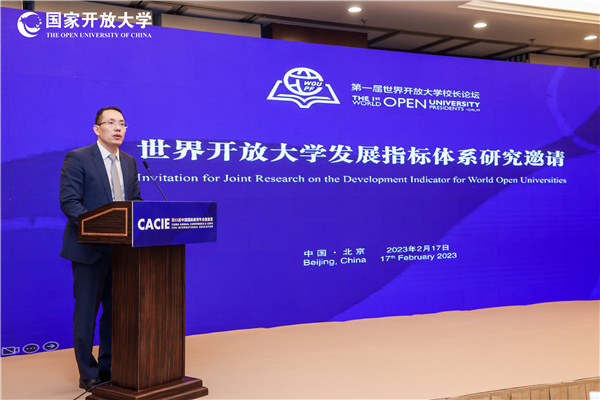 On the afternoon of February 17th, the first World Open University Presidents Forum, initiated and hosted by the Open University of China, was held at the Beijing International Conference Centre. The forum was themed "Creating a New World Together: The Initiative of Open Education Digitalisation Addressing the Coming Challenges " and invited presidents of open universities worldwide to come together, look towards the future, discuss strategies for the development of open universities, seek to promote the digital transformation of open universities, build a community for the development of world open education, and thereby facilitate the reshaping and transformation of open education.
On the afternoon of February 17th, the first World Open University Presidents Forum, initiated and hosted by the Open University of China, was held at the Beijing International Conference Centre. The forum was themed "Creating a New World Together: The Initiative of Open Education Digitalisation Addressing the Coming Challenges " and invited presidents of open universities worldwide to come together, look towards the future, discuss strategies for the development of open universities, seek to promote the digital transformation of open universities, build a community for the development of world open education, and thereby facilitate the reshaping and transformation of open education.
The forum extended an invitation to open universities around the world, as well as international organisations and experts who care about and support the development of open universities, to share data and conduct joint research. At the same time, it launched an initiative on joint establishment of the "Belt and Road" Open Education Development Alliance.


Onsite of the forum
Fang Jun, the Deputy Director-General and Primary Inspector of the Department of International Cooperation and Exchanges of the Chinese Ministry of Education, and Shahbaz Khan, Director of the UNESCO Beijing Cluster Office, attended the forum and delivered speeches. The speech session was chaired by Yu Yougen, Deputy Secretary-General of the China Education Association for International Exchange (CEAIE).
11 open university presidents from 8 countries and regions delivered keynote speeches at the forum, including Jing Degang, Secretary of the Party Committee and President of the OUC; Tim Blackman, Vice-Chancellor of the Open University, UK; Peter Scott, President of Athabasca University in Canada; Mansoor Al Awar, Chancellor of Hamdan Bin Mohammed Smart University, UAE; Chu Hongqi, Deputy Secretary of the Party Committee and President of the Open University of Beijing; Ojat Darojat, Rector of Terbuka University in Indonesia; Zhang Xike, Deputy Secretary of the Party Committee and President of Qingdao Open University, China; Fuat Erdal, President of Anadolu University in Turkey; Wang Ling, Deputy Secretary of the Party Committee and President of the Open University of Sichuan, China; Ahmad Izanee Awang, President of the Open University Malaysia; and Rodrigo Arias Camacho, President of the National Distance University of Costa Rica. The keynote speech session was chaired by Fan Xianrui, Member of the Party Committee and Vice President of the OUC.

Fang Jun, Deputy Director-General and Primary Inspector of the Department of
International Cooperation and Exchanges of the Chinese Ministry of Education, is delivering a speech.

Shahbaz Khan, Director of UNESCO Beijing Cluster Office, is delivering a speech.

Yu Yougen, Deputy Secretary-General of CEAIE, is hosting the speech session.
In his speech, Deputy Director and Primary Inspector of the Department of International Cooperation and Exchanges of the Chinese Ministry of Education, Fang Jun, congratulated the successful holding of the first World Open University Presidents Forum and expressed sincere thanks to the OUC for its meticulous preparation for the forum. He pointed out that the development and transformation of education require digital transformation. Around the world, countries are taking active actions to use digitalisation of education as an important means to address crisis challenges and open the future of education. However, in promoting the digitalisation of education, many common problems and challenges have been encountered, which need to be jointly solved through international cooperation. He stated that China's open-university system has always been a pioneer in the digitalisation of education. Faced with new situations, open universities have focused on leveraging the advantages of the integration of online and offline education, continuously promoting the digital transformation of learning resources, teaching processes, examinations and assessments, management and services, and have achieved significant results in promoting the high-quality development of open education. He hopes that China and foreign countries will deepen cooperation, strengthen policy dialogue and practical exchanges in digitalisation of education, promote infrastructure connectivity and sharing of digital resources, carry out extensive exchanges and cooperation in teacher and manager training to enhance capacity building, and establish mechanisms to build new platforms for international cooperation among the world's open universities.
In his speech, Shahbaz Khan, Director of UNESCO Beijing Cluster Office, acknowledged the OUC to organise this timely forum in the context of on-going fundamental challenges faced by education systems globally due to COVID-19 pandemic. He noted that, the forum is being organised straight after the September 2022 United Nations Transforming Education Summit attended by the Governments who reiterated their commitment to transform education systems so that no one is left behind. United Nations Transforming Education Summit was attended by the Governments who reiterated their commitment to transform education systems so that no one is left behind. UNESCO is aware of the vast and complex challenges of promoting open and distance education for all. The target can only be met through concerted actions at all levels, especially by developing digital platforms that ensure learning continues during emergencies and promote lifelong learning. He stressed that the first World Open University Presidents Forum can be a good platform in sharing good practices address some of fundamental issues in ODL.

Jing Degang, OUC President and Secretary of the Party Committee, is making a keynote speech.
The Secretary of the Party Committee and President of the OUC, Jing Degang, delivered a keynote speech entitled "Deepening the Digitisation of Education and Building a Digital University". Jing Degang stated that currently, the world is undergoing global changes of a magnitude not seen in a century, with the rapid development of a new round of technological revolution and industrial transformation, as well as the far-reaching impact of the pandemic of the century. In the face of the future digital society, the urgent task is to build a learning society based on digital skills.
Jing Degang emphasised that it is necessary to focus on building a digital university to promote the construction of a society and country of learning where lifelong learning is pursued by all. In practice, the OUC is working to implement "four digitalisations," namely the digitalisation of learning resources, teaching processes, examinations and assessments, management and services. Among them, the digitalisation of learning resources and teaching processes involves the reengineering of resources and services, making learning content high-quality, flexible, and more accessible, while also making teaching processes more manageable, analyzable, and effective, and enabling more efficient learning to take place. The digitalisation of examinations and assessments aims to solve difficult and problematic issues, seeking the optimal solution in terms of scalability, flexibility, and seriousness. The digitalisation of management and services aims to solve problems related to service supply, transforming and breaking through in the areas of precision, personalization, and intelligence, which is also a fundamental requirement for the modernisation of the open-university's governance system and governance capabilities.
Jing Degang shared the initial path of building a digital university and proposed five key areas of work for the construction of a digital university. Firstly, digitalisation should be used to drive educational and teaching reforms, and enhance the digitalisation of teaching processes. Secondly, digitalisation should be used to promote the fundamental task of fostering virtue through education, and enhance the digitalisation of comprehensive evaluation. Thirdly, digital learning resources should be used to meet the diverse learning needs of the people, and enhance the digitalisation of learning resources. Fourthly, digitalisation should be used to improve the adaptability of open education talent cultivation, and enhance the quality of open education talent cultivation. Fifthly, digitalisation should be used to promote the comprehensive development of students, and enhance the digitalisation of core competencies.
Jing Degang pointed out that in the digital age, the OUC has implemented a digital strategy action for open universities and proposed the grand goal of "building a digital university that connects the world". The goal is to use "digitalisation" as the core, "Internet+ University" as the path, and follow the principles of "demand-driven, application-oriented, and service-oriented" to continuously strengthen the comprehensive application and transformation of technology in education. With digitalisation as the leading force, it will drive the overall transformation of open education. He hopes that with the correct leadership of the Party group of the Ministry of Education and the strong support of the global open universities and all sectors of society, the goal of building "a digital university that connects the world" will surely be achieved in the near future through the joint efforts of the OUC system.

11 university presidents shared their explorations and practices in open education digitalisation actions to address new challenges from different perspectives, including education new infrastructure construction, digital resource supply and construction standards, learning process behavior analysis, and priority areas of concern for open universities around the world. They provided a comprehensive view of the current global development process of open-university digitalisation for the participants. They unanimously agreed that the profound impacts of the world's century-long changes, the global pandemic, social and economic inequality, climate change, and digital technology revolution have deeply affected the development of education. In this context, digitalisation is not an option but a necessity. The digital transformation of open education is a systemic change that requires multi-party collaborative promotion, and open universities should actively participate in it, and jointly promote the international development of open education towards higher quality. Zhang Ke, the Trade Commissioner (Education) of the Canadian Embassy in China, and Stellah Kambu, the Third Secretary of the Embassy of Papua New Guinea in China, attended the meeting and gave speeches.

Fan Xianrui, Vice President and Member of the Party Committee of the OUC, is hosting the keynote speech session.
As an important part of the forum, the “Development Indicator System for World Open Universities” was released in a special research session. The research was launched by the OUC in 2022, and has initially constructed a development indicator system for open universities around the world, collected indicator data from multiple countries (regions) with open universities, and built a special website for the “Development Indicator System for World Open Universities". Through solid basic data and empirical analysis, the research will provide decision-making reference and direction guidance for the high-quality and sustainable development of open universities around the world.

Li Song, Vice President of the OUC, sent an invitation for joint research on the development indicator for world open universities.
The first World Open University Presidents Forum received strong support from the CEAIE. As one of the parallel forums of the 23rd China Annual Conference & Expo for International Education, the forum aimed to discuss strategies for the development of open universities, explore the digital transformation of open universities, and jointly build a global community for the development of open education. It became a highlight of the parallel forums of the annual conference, attracting more than 600 representatives from over 10 countries and regions to participate online and offline.
By He Man, OUC